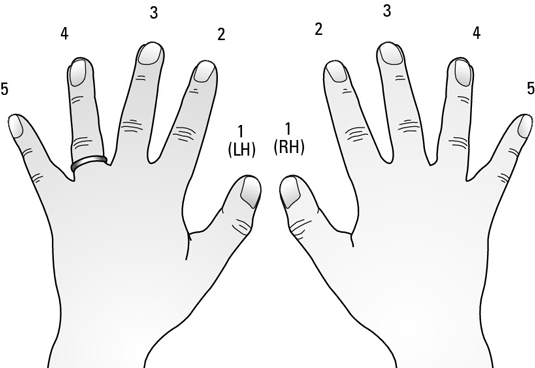 Those pesky little numbers above or below the notes on the sheet music… they’re one more thing for you to follow that you could do without, right?
Those pesky little numbers above or below the notes on the sheet music… they’re one more thing for you to follow that you could do without, right?
After all, you’re busy following the notes and timing, etc. Surely you can just use whichever fingers you prefer?
Well… not quite. The finger numbers are actually there to help you.
There are many benefits to using the correct fingering, one of which is; by deciding upon a set sequence of fingering for each piece, and using that fingering consistently, you are calling upon your muscle memory to help you learn and perform each piece with stability.
In other words, in addition to the mental learning in a song (e.g. the sequence of notes), there is also a physical learning whereby we learn the physical shape of the movements required to play the piece comfortably and reliably.
If you are inconsistent with your fingering, you will be much less secure and confident when playing in front of others.
There are also plenty of other reasons for using the prescribed fingers. Trust me when I say, it’s a mistake not to use the correct / prescribed fingers.
So how do you keep yourself motivated to make the effort to follow the finger numbers and use the correct fingers? And how do we encourage younger students to play with the correct fingers?
If you’re a parent or piano teacher, how best to encourage younger students to use the correct fingers will vary depending on such factors as your parenting / teaching style, the personality and maturity level of each student, the level of their skills and knowledge, etc.
For most kids (and even adults), an effective approach is to help them understand why it's in their best interests to follow the finger numbers and use the correct fingers.
In most piano lessons, and especially in the case of Musiah lessons, students are gradually taught a system of fingering they can use as they become more advanced so that they will always know the best fingers to use in any piece they might choose to learn (whether or not the fingering is written on the sheet music).
The prescribed fingering is 99% of the time derived from two principles;
a) the fingering one would use to play scales and
b) the fingers that correspond to the current hand position (also known as the five finger position),
e.g. if the Right Hand is in the C position, it helps to know that the 2nd finger will always be on D, the 3rd finger on E, etc.
Using the correct fingers means students will grow to automatically know which fingers to use because they will be aware of their hand positions and they’ll recognize scales when they occur in pieces.
They’ll also make fewer mistakes, they won’t need to look down at their hands unnecessarily (so they can follow the sheet music more easily), and they will be able to play their pieces faster and with more confidence than if they use the wrong fingers.
When encouraging younger students to modify their behaviour, it often helps to ask them questions in order to get them thinking about what they are doing (or not doing), e.g.;
1) Would you like to be able to play your pieces with fewer mistakes?
2) Would you like to be able to play faster and with more confidence?
3) Would you like to always know which fingers are the best ones to use?
4) Would you like to be able to play without needing to look down at your hands?
Hopefully, the answer to each of these questions will be "Yes".
In which case, you can follow up with...
“Then, you need to use the correct fingers – now, while you are still in the early stage of your piano lessons journey. Very soon, you will be a much better pianist if you do.”
I hope these brief thoughts on the benefits of following and using the correct fingers are helpful.
To experience how Musiah piano lessons naturally encourage students to;
why not take our Musiah Piano Lessons 14 Day Free Trial.
Happy playing,
Brendan Hogan L.Mus.A, A.Mus.A.
Piano Teacher & Musiah Inventor
Online Piano lessons – Do They Work?
Piano Lessons For Adults
Piano Lessons For Kids
Piano Lessons For Beginners
Advanced Piano Lessons
Free Piano Lessons (on piano technique)
The Best Piano Method
The Best Piano Learning App
Learning To Play Piano As An Adult – Why it's easier than you think!